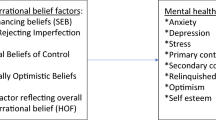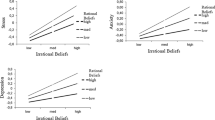Abstract
In two studies, one correlational (N = 158) and one experimental (N = 128), using college students, it was found that Need for Achievement, Need for Approval and Self-Downing were the most important irrational beliefs of the General Attitude and Belief Scale predicting unconditional self-acceptance. The Need for Comfort, Demand for Fairness and Other-Downing subscales were found to be less influential. The findings were discussed in terms of Ellis’ theoretical formulation of four higher-order types of irrational belief processes (demandingness, awfulizing, low-frustration tolerance and self-downing), empirical research on different irrational belief themes, the distinction between ego disturbance and discomfort disturbance in REBT and the distinction between sociotropy and autonomy in different forms of depression.

Similar content being viewed by others
References
Bernard, M. E. (1998). Validation of the General Attitude and Belief Scale. Journal of Rational-Emotive and Cognitive-Behavior Therapy, 16, 183–196
Bessai, J. L., & Lane, S. H. (1976). Self-rating scale for rationality: An update. Rational Living, 11, 28–30
Blascovich, J., & Tomaka, J. (1991). Measures of self-esteem. In J. P. Robinson, P. R. Shaver & L. S. Wrightsman (Eds.), Measures of personality and social psychological attitudes, (pp. 115–160). New York: Academic Press
Bond, F.W., & Dryden W. (1996). Testing an REBT theory: The effects of rational beliefs, irrational beliefs, and their control or certainty contents on the functionality of inferences. II. In a personal context. International Journal of Psychotherapy, 1, 55–77
Bond, F.W., & Dryden W. (1997). Testing an REBT theory: The effects of rational beliefs, irrational beliefs, and their control or certainty contents on the functionality of inferences. I. In a social context. Journal of Rational-Emotive and Cognitive-Behavior Therapy, 15, 157–188
Chamberlain, J. M., & Haaga, D. A. F. (2001a). Unconditional self-acceptance and psychological health. Journal of Rational-Emotive and Cognitive-Behavior Therapy, 19, 163–176
Chamberlain, J. M., & Haaga, D. A. F. (2001b). Unconditional self-acceptance and responses to negative feedback. Journal of Rational-Emotive and Cognitive-Behavior Therapy, 19, 177–189
Ciarrochi, J. (2004). Relationships between dysfunctional beliefs and positive and negative indices of well-being: A critical evaluation of the Common Beliefs Survey-III. Journal of Rational-Emotive and Cognitive-Behavior Therapy, 22, 171–188
Davies, M. F. (2006). Irrational beliefs and unconditional self-acceptance. I. Correlational evidence linking two key features of REBT. Journal of Rational-Emotive and Cognitive-Behavior Therapy, 24, 113–124
Davies, M. F. (in press). Irrational beliefs and unconditional self-acceptance. II. Experimental evidence for a causal link between two key features of REBT. Journal of Rational-Emotive and Cognitive-Behavior Therapy
DiGiuseppe, R., & Leaf, R. C. (1990). The endorsement of irrational beliefs in a general clinical population. Journal of Rational-Emotive and Cognitive-Behavior Therapy, 8, 235–247
DiGiuseppe, R., Leaf, R., Exner, T., & Robin, M. W. (1988). The development of a measure of rational/irrational thinking. Paper presented at the World Congress of Behavior Therapy, Edinburgh, Scotland, September
Dryden, W., & Neenan, M. (2004). The rational emotive behavioral approach to therapeutic change. London: Sage
Ellis, A. (1962). Reason and emotion in psychotherapy. New York: Lyle Stuart
Ellis, A. (1979a). Discomfort anxiety: A new cognitive behavioral construct. Part 1. Rational Living, 14, 3–8
Ellis, A. (1979b). Discomfort anxiety: A new cognitive behavioral construct. Part 2. Rational Living, 15, 25–30
Ellis, A. (1994). Reason and emotion in psychotherapy: A comprehensive method of treating human disturbances. New York: Birch Lane Press
Fresco, D. M., Sampson, W. S., Craighead, L. W., & Koons, A. N. (2001). The relationship of sociotropy and autonomy to symptoms of depression and anxiety. Journal of Cognitive Psychotherapy, 15, 17–31
Higgins, E. T. (1996). Knowledge activation: Accessibility, applicability and salience. In E. T. Higgins & A. W. Kruglanski (Eds.), Social psychology: Handbook of basic principles (pp. 133–168). New York: Guilford
Robins, C. J., & Luten, A. G. (1991). Sociotropy and autonomy: Differential patterns of clinical presentation in unipolar depression. Journal of Abnormal Psychology, 100, 71–77
Rosenberg, M. (1965). Society and the adolescent self-image. Princeton, NJ: Princeton University Press
Thorpe, G. L., Parker, J. D., & Barnes, G. S. (1992). The Common Beliefs Survey III and its subscales: Discriminant validity in clinical and nonclinical subjects. Journal of Rational-Emotive and Cognitive-Behavior Therapy, 10, 95–104
Tosi, D. J., Forman, M. A., Rudy, D. R., & Murphy, M. A. (1986). Factor analysis of the Common Beliefs Survey III: A replication study. Journal of Consulting and Clinical Psychology, 54, 404–405
Author information
Authors and Affiliations
Corresponding author
Rights and permissions
About this article
Cite this article
Davies, M.F. Irrational Beliefs and Unconditional Self-Acceptance. III. The Relative Importance of Different Types of Irrational Belief. J Rat-Emo Cognitive-Behav Ther 26, 102–118 (2008). https://doi.org/10.1007/s10942-007-0061-6
Published:
Issue Date:
DOI: https://doi.org/10.1007/s10942-007-0061-6




